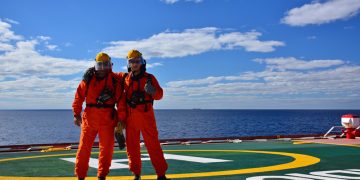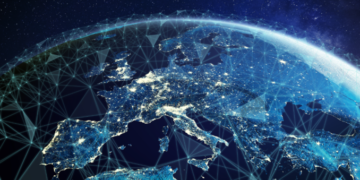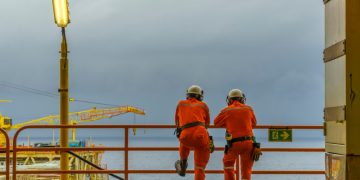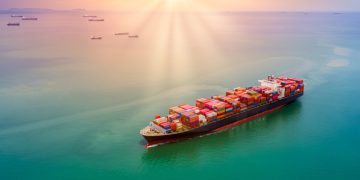The maritime industry in 2024 showcased a sector striving to balance innovation with pressing safety and sustainability challenges.
While strides were made in digitalization, green shipping, and safety frameworks, incidents like the Dali crash and ongoing geopolitical instability underscored the challenges ahead. The year marked a transformative shift toward decarbonization, with renewed interest in wind power and emerging focus on nuclear energy to reduce greenhouse gas emissions. Efforts to secure seafarer welfare, address environmental risks, and embrace cleaner energy sources will remain priorities for 2025 and beyond.
As we count down to the new year, let’s take a moment to reflect on some key moments from 2024:
#1 Preparing for the FuelEU Maritime
With the FuelEU Maritime Regulation set to come into force on 1 January 2025, the BIMCO FuelEU Maritime Clause for Time Charter Parties 2024 was adopted by BIMCO’s Documentary Committee on 25 November. The new regulation introduces measures to ensure a gradual reduction in the greenhouse gas intensity of fuels used by the shipping sector, targeting a decrease of 2% in 2025 and up to 80% by 2050, among other provisions. The majority of the rules will apply starting 1 January 2025, except for Articles 8 and 9, which take effect on 31 August 2024. However, in early December, Norway announced that, due to delays in incorporating the FuelEU Maritime Regulation into the EEA Agreement, it is unlikely the country will implement the regulation by 1 January 2025. DNV emphasized that it is crucial for shipowners to understand the regulation’s requirements and compliance options to make informed business decisions. “Adopting a cost-efficient strategy with the right combination of measures can help shipowners achieve compliance at reduced costs,” DNV stated in a recent report. Nevertheless, as the Mærsk Mc-Kinney Møller Center for Zero Carbon Shipping (MMMCZCS) noted in September, “spending on FuelEU is relatively low compared to what companies will pay for ETS allowances.”
#2 Industry embraces wind propulsion
In 2024, the maritime industry made significant progress in exploring wind propulsion as a decarbonization tool, with major operators retrofitting vessels with wind-assisted propulsion systems (WAPS) like rotor sails, wing sails, and kite systems to enhance fuel efficiency and reduce emissions. Projections for adoption vary: the EU previously estimated 3,700–10,700 installations by 2030, while the UK government envisions 40–45% of the global fleet using wind propulsion by 2050. Despite this optimism, widespread adoption faces regulatory, technical, and logistical challenges. Evaluating system efficiency remains complex due to factors like ship design, operations, and environmental conditions. Bureau Veritas and Lloyd’s Register highlighted hurdles such as the lack of standardized criteria, hidden costs, and the need for significant scale-up in the supply chain. Achieving 15% global fleet adoption would require a 75-fold increase in WAPS production, but only 16 shipyards currently perform retrofits. Moving forward, detailed project planning, crew training, and coordinated supply chain efforts will be essential to overcome these obstacles.
#3 Geopolitical conflicts remain key challenge for shipping
Disruptions in global maritime trade significantly impacted key routes such as the Red Sea and the Suez Canal throughout 2024. In January, the UN Security Council adopted a key resolution condemning Houthi attacks on merchant and commercial vessels, demanding the immediate release of the Galaxy Leader and its crew. Throughout the year, multiple incidents were reported. For example, on 28 October, the UK Maritime Trade Operations (UKMTO) reported three explosions south of Al Mukha, Yemen, near a merchant vessel. This incident followed a missile attack on the Liberia-flagged Olympic Spirit just days earlier. Prior to this, on 10 October, the same Liberian-flagged chemical tanker had been targeted in another attack. In response to escalating threats, major industry associations issued updated guidance in late September for vessels transiting the Southern Red Sea and Gulf of Aden. This guidance, intended to be read alongside the latest version of BMP (Best Management Practices), was prompted by Houthi threats expanding beyond vessels suspected of having ties to Israel. Consequently, many shipowners and operators have opted for alternative routes to ensure safety.
#4 Need to review seafarers’ training
The Maritime Just Transition Task Force (MJTTF) launched a new report in November, in partnership with Lloyd’s Register’s Maritime Decarbonisation Hub and the United Nations Global Compact Ocean Stewardship Coalition. The report underscores the urgent need for a baseline training framework tailored to the unique challenges associated with ammonia, methanol, and hydrogen. Currently, the Standards of Training, Certification, and Watchkeeping for Seafarers (STCW) Convention do not adequately cover the specific competencies required to handle these alternative fuels. In response, the report advocates for a comprehensive overhaul of training frameworks to ensure a safe and effective transition to these new energy sources. Furthermore, during the IMO MSC 108, amendments to the STCW Code were adopted, which aim to prevent and respond to violence and harassment in the maritime sector, including sexual harassment, bullying and sexual assault
#5 Crew Welfare remained a top priority
2024 marked a significant year of crew welfare as a new set of amendments to the MLC, 2006 entered into force on 23 December. These amendments aim at further improving working and living conditions at sea and address some of the key challenges faced by seafarers during the COVID-19 pandemic. In November, the “Third meeting of the Joint ILO–IMO Tripartite Working Group to Identify and Address Seafarers’ Issues and the Human Element” took place 26-28 November in Geneva, discussing and adopting ‘Guidelines on the fair treatment of seafarers detained on suspicion of committing crimes’. Furthermore, Paris & Tokyo MoU on Port State Control launched a joint Concentrated Inspection Campaign (CIC) from 1st September 2024 to 30th November 2024 on Crew Wages and Seafarer Employment Agreement (SEA). Recently, RISK4SEA issued the final results and the CIC Intensity Index which identifies key focus areas. Finally, it is worth mentioning that a study published in September by the World Maritime University, revealed that seafarers face excessive working hours and insufficient rest, leading to high levels of fatigue.
#6 Rise in violence against crews
In mid-2024, the ICC’s International Maritime Bureau (IMB) called for sustained vigilance to protect seafarers amid increasing violence, despite an overall drop in the number of incidents reported in IMB’s mid-year report for 2024. Violence towards crew members continues, IMB noted and raised concerns about the rising number of incidents in the Indonesian archipelago and Bangladesh. December 2024 was a month of high piracy activity while IMO MCS 109 ,held on 2-6 December, focused on the ongoing attacks on international shipping in the Red Sea area and the Black Sea area. Hearing the statements, the MSC expressed its concern over the safety and welfare of seafarers, freedom of navigation, threats to the marine environment and stability of the global supply chain resulting from the attacks by Houthis on commercial ships in the Red Sea and Gulf of Aden. Furthermore, the Committee reiterated the call for the immediate release of the MV Galaxy Leader and its 25 seafarers which have remained captive since its hijacking in November 2023, marking a year of imprisonment of innocent seafarers.
#7 SIRE 2.0 officially goes live
OCIMF confirmed that its digitalised Ship Inspection Report Programme (SIRE 2.0) was scheduled to ‘go-live’ on Monday 2 September 2024 and become the standard tanker inspection tool for the marine industry. As explained, this move to SIRE 2.0 will mark the end of the phased transition to the updated, enhanced and digitalised tanker inspection programme. The new programme is expected to revolutionise how the marine industry evaluates the safety and operational condition of tankers and their crews on an ongoing basis.
#8 RightShip introduces a new age inspection system
In October 2024, RightShip announced a change to its vessel inspection policy, lowering the age threshold at which inspections are required to address ongoing safety risks in the Dry Bulk and General Cargo sectors. The new policy is set to be implemented in two phases starting on March 31, 2025, according to the organization. However, INTERCARGO initially expressed concerns over the decision, criticizing it as having been “made without prior consultation with bulk carrier owners and managers—the very stakeholders most affected by such changes.” In response, a few weeks later, RightShip announced a revised timeline for implementing its vessel inspection age trigger. The updated policy reduces the inspection threshold from 14 to 10 years and will be introduced through a four-phased approach.This revision was the result of constructive dialogue with RightShip’s customers and respected industry associations, including INTERCARGO, the International Chamber of Shipping (ICS), and the Union of Greek Shipowners. Their collaboration was instrumental in refining the approach to align with operational realities while reinforcing all stakeholders’ shared commitment to safety.
#9 Philippines implements Magna Carta
On September 23, 2024, President Ferdinand Marcos Jr. officially enacted the Magna Carta of Filipino Seafarers, also known as Republic Act 12021, during a ceremony at Malacañang. The Magna Carta aims to safeguard the rights and welfare of Filipino seafarers, guaranteeing their right to fair working conditions, self-organization, collective bargaining, access to affordable education and training, and information. It also ensures that seafarers’ families or next of kin receive necessary information and protects against discrimination.
#10 Collision of the container ship Dali
On March 26, 2024, the container ship Dali collided with the Francis Scott Key Bridge in Baltimore, Maryland, leading to a catastrophic collapse of the bridge. The incident resulted in the tragic loss of six construction workers’ lives and caused significant disruptions to the Port of Baltimore, one of the nation’s largest ports. In September 2024, the U.S. Department of Justice filed a $100 million lawsuit against Grace Ocean Private Limited and Synergy Maritime PTE, the owners and managers of the Dali. In October 2024, the owners and managers of the Dali agreed to pay $102 million to cover cleanup costs associated with the incident. This settlement addresses the immediate financial impacts but does not cover the full costs of rebuilding the bridge, which are estimated to be nearly $2 billion. As of December 2024, the Dali has been removed from the site of the collision and is undergoing repairs. The NTSB continues its investigation into the causes of the incident, focusing on the ship’s electrical systems and maintenance records. The Port of Baltimore has implemented measures to prevent similar incidents in the future, including enhanced safety protocols and infrastructure assessments.
#11 COP29 puts shipping under pressure
Mid-November became a pivotal moment for global climate action as world leaders, activists, and experts gathered for COP29—the 29th Conference of the Parties to the United Nations Framework Convention on Climate Change (UNFCCC). With high stakes and anticipation in the air, the event brought renewed focus to the urgent challenge of combating climate change and charting a transformative path. Held in Baku, Azerbaijan, from November 11–22, 2024, COP 29 brought together representatives from nearly 200 countries to negotiate and advance policies and actions to combat climate change.
#12 EU ETS and developments
As of January 1, 2024, the European Union has expanded its Emissions Trading System (EU ETS) to include the maritime sector, marking a significant step toward reducing greenhouse gas emissions from shipping. Shipping companies have to purchase and surrender (use) EU ETS emission allowances for each tonne of reported greenhouse gas emissions. Failure to comply will result in penalties, including fines and port entry bans. Recenlty, OceanScore explored the challenges and lessons learned from the first year of the EU Emissions Trading System (EU ETS), regarding both the technical and commercial obstacles encountered. Even though the EU ETS currently applies to ships of 5000 GT and above, it is expected that general cargo and offshore vessels between 400 and 5000 GT will be included from 2027.
#13 Harassment & bullying updates
In February 2024, the International Chamber of Shipping (ICS) launched a set of industry principles for establishing effective measures to combat and eliminate harassment and bullying in the maritime sector. Additionally, the American Club continued to raise awareness on the topic with updated instalments in its SASH Awareness project, for which it received the 2024 SAFETY4SEA Sustainability Award. It is also worth mentioning that ISWAN launched the ‘Allyship’ project, which suggests best practices for addressing inappropriate behavior and building strong support networks.
#14 New ISO standards launched
On May 30th, ISO announced that the eagerly awaited ISO 8217:2024 has now been published and is available for purchase on their website. This marine fuel specification standard has undergone significant revisions, taking into account the industry’s needs as well as the most recent industry experience and knowledge. In November, ISO launched the first edition of ISO 6583:2024, a new standard for methanol as a marine fuel. The document specifies three categories of methanol: Marine Methanol Grade A (MMA), Marine Methanol Grade B (MMB), and Marine Methanol Grade C (MMC). Also, in the same month, ISO issued Standard 4891:2024, outlining the requirements for smart applications onboard ships
#15 2024 lays a solid foundation for nuclear power in maritime transportation
In 2024, the maritime industry witnessed significant advancements in nuclear propulsion, underscoring a global shift toward sustainable and efficient shipping solutions. Key developments include:
- In March 2024, HD Hyundai Shipbuilding & Offshore Engineering (KSOE) disclosed the establishment of the Nuclear Energy Maritime Organization (NEMO) in collaboration with prominent international nuclear energy entities.
- In August 2024, Danish shipping giant Maersk partnered with Lloyd’s Register and UK-based Core Power to explore the feasibility of nuclear-powered container shipping in Europe.
- In July 2024, Lloyd’s Register released a report highlighting the transformative potential of nuclear propulsion in the maritime sector.
- The American Bureau of Shipping (ABS) introduced new requirements for nuclear power systems in marine and offshore applications. These guidelines provide a framework for the design, construction, and operation of nuclear-powered vessels, aiming to ensure safety and regulatory compliance.
- In October 2024, IMO Secretary-General, Arsenio Dominguez, confirmed that nuclear propulsion is being actively considered as a future marine fuel solution within the organisation’s Marine Environmental Protection Committee’s (MEPC) processes.
- In December 2024, EMSA initiated a study on the potential for nuclear-electric ships in response to multiple requests from Member States and industry stakeholders.
#16 Industry leaders expressed concern over certain CII flaws
In March 2024, IBIA made an assessment of the Carbon Intensity Indicator (CII) operational energy efficiency rating for ships, highlighting that ”initial findings indicate a clear problem for bunker vessels to comply with limited scope for enhancing the operational energy efficiency to achieve the required C rating”.
Also, other industry groups argued that the one-size-fits-all CII framework unfairly penalizes these vessels. Six major shipping organizations, including BIMCO and INTERTANKO, called for a revised CII methodology that accounts for the unique service of short voyages. The IMO’s MEPC acknowledged these concerns and agreed to review the CII mechanism. IBIA proposed a short voyage correction factor to ensure fairer CII ratings. This effort is part of a broader industry push to refine the CII system to better reflect environmental performance and support global GHG reduction goals. The industry discussed the issue at MEPC 82 in September 2024 and decide to commence a more accurate and equitable CII framework.
#17 Where we stand with diversity
In celebration of the International Day for Women in Maritime on May 8, 2024, the International Maritime Organization (IMO) hosted a symposium where experts explored how incorporating women’s perspectives can shape the future of maritime safety. A key focus of the discussion was the pivotal role of mentorship and training in raising the visibility of women and ensuring their success in this demanding industry. In September 2024, IMO and WISTA announced the launch of their second survey for women in maritime while in November 2024, Women in Transport announced the launch of their second annual Women in Transport Equity Index Survey, calling for wide participation within the sector with the goal of understanding and enhancing diversity and inclusion. Recently, DSG’s data from shore-based employees and seafarers highlighted a worrying decline in women’s representation in leadership roles, with fewer women being promoted to senior positions.
#18 Singapore remains a top maritime center
For the 11th consecutive year, Singapore has been recognized as the world’s leading shipping hub by the Xinhua-Baltic International Shipping Centre Development Index (ISCDI) Report, with an impressive score of 96.23 out of 100. This enduring success can be attributed to Singapore’s strategic location, strong international outlook, and a well-established ecosystem of professional maritime services. In addition, Singapore has made remarkable strides in supporting maritime decarbonization and transformation through the supply of biofuels. Bunker sales of biofuel blends surged to 520,000 tonnes in 2023—more than triple the 140,000 tonnes recorded in 2022—according to the Maritime and Port Authority of Singapore (MPA). Industry experts and fuel suppliers anticipate that this upward trend will continue in the years ahead. Further advancing its maritime capabilities, the MPA announced that it will mandate the updated bunker mass flow metering standard starting 1 April 2025. This move underscores Singapore’s commitment to enhancing operational transparency and efficiency within the shipping industry. Lastly, while not officially recognized, Singapore is often considered the world’s 6th “blue zone“—a symbolic designation that highlights its achievements in fostering longevity and well-being.
#19 Scaling up opportunities: Several mergers announced
2024 was a pivotal year for several organizations to think big. Consequently, we witnessed numerous acquisitions and mergers. For example, only in Q4, the following announcements were made:
- Lloyd’s Register Group (LR) completed the acquisition of Ocean Technologies Group (OTG) from the European private equity firm Oakley Capital.
- Cargotec signed an agreement to sell its MacGregor business area to funds managed by Triton, for an enterprise value of EUR 480 million to support Hiab’s future growth.
- Kpler, announced its acquisition of Spire Maritime, a provider of satellite-powered data for real-time global vessel tracking.
- Intership Navigation and Interorient Shipmanagement announced the merger of their ship management activities which will include Intership’s sister company Donnelly Tanker Management.
- Torvald Klaveness announced the sale of 100% of Klaveness Ship Management AS’ shares to OSM Thome.
- Mitsui O.S.K. Lines, Ltd. (MOL) has announced that, effective April 1, 2025, it will merge three of its subsidiaries focused on green maritime technology and engineering: MOL Marine & Engineering Co., Ltd. (MOLMEC), MOL Ocean Expert Co., Ltd. (MOLOX), and MOL Ship Tech Inc. (MOLST).
- DNV acquired CyberOwl to bolster the cyber defenses of the shipping industry, forming one of the largest maritime cyber security specialists. Explore more at https://safety4sea.com/tag/merger/
#20 Key actions towards a safer ship-recycling
In February, BIMCO, Bangladesh, India, Norway, Pakistan and the ICS, submitted a paper to the IMO, to highlight the need to solve possible conflicting requirements of the Hong Kong Convention and the Basel Convention which could have severe consequences, if unresolved. A few months later, the IMO issued guidance regarding the implementation of the Hong Kong and Basel Conventions. However, BIMCO stressed there is a need for more legal certainty on the application of the Hong Kong Convention before entry into force in June 2025. In that regard, BIMCO launched a Ship Recycling Alliance to help accelerate safe and environmentally sound recycling of ships in November 2024.
#21 Trump’s election raises key questions for global trade
In November 2024, Donald Trump won a second term in the White House with an economic policy aimed at revitalizing American manufacturing and countering what the United States regards as China’s unfair trade practices. Ocean container shipping, a global industry reliant on international trade, faced immediate uncertainties as Trump’s strategy of higher import tariffs raised a number of key questions. Xeneta noted that Trump’s new trade policy is more radical than during his first term in office, extending beyond the trade war with China to include tariffs of up to 20% on imports from other parts of the world. ‘’Once the full details of Trump’s tariff framework are known, it may well be the case that other nations and trading blocs, such as the EU, respond in a manner similar to China during the first trade war by imposing tariffs of their own. For that reason, it is important to monitor ocean container shipping data on backhaul trades, as these could also be impacted if a trade war with the US escalates on a more widespread global level,’’ the firm advised. On December 22nd, the Associated Press reported that Donald Trump suggested his new administration could try to regain control of the Panama Canal, which the United States had “foolishly” ceded to its Central American ally. Trump contended that shippers are charged “ridiculous” fees to pass through the vital transportation channel linking the Atlantic and Pacific Oceans.
#22 Best practices against shadow trade
In October 2024, the Price Cap Coalition issued an advisory regarding shadow trade, that includes the following recommendations for the maritime stakeholders:
- Require appropriately capitalized P&I insurance
- Receive classification from an IACS member society
- Best-practice use of Automatic Identification Systems (AIS)
- Monitor high-risk ship-to-ship transfers
- Request associated shipping and ancillary costs
- Undertake appropriate due diligence
- Report ships that trigger concerns
- Ensure vessels meet international maritime safety and environmental obligations
- Monitor tanker sales
- Avoid interactions with sanctioned parties
- Raise awareness and enhance market transparency. Explore more at https://tinyurl.com/546vac3z
#23 New leadership positions announced
Recent announcements include:
- The World Shipping Council (WSC) Board of Directors has elected Soren Toft as the new Chair of the WSC Board and Randy Chen as Vice Chair.
- At a special meeting of the board, held online, the International Chamber of Shipping (ICS) has unanimously appointed Thomas A. Kazakos as its next Secretary General.
- INTERTANKO’s Council of Members has confirmed Tim Wilkins to succeed Katharina Stanzel as Managing Director, effective 1 January 2025.
- The Australian Government has welcomed Kaylene Dale as the new Chief Executive Officer of the Australian Maritime Safety Authority (AMSA), starting on 1 October 2024.
- Wilhelmsen Ship Management has announced the retirement of Carl Schou after 19 years of service, including 16 years as CEO. Haakon Lenz, currently serving as Chief Operating Officer, will assume the role of CEO on 1 January 2025.
- During its annual general meeting, held in London on 15 October, INTERCARGO elected Yannis Xylas as its new Chairman.
#24 Theme of next year’s World Maritime Day announced
According to the IMO, “Our Ocean, Our Obligation, Our Opportunity” has been selected as World Maritime Day theme for 2025, to be celebrated on 25 September 2025. The new theme emphasizes the link to wider global efforts to protect the ocean including the conclusion of UN Agreement on the Conservation and Sustainable Use of Marine Biological Diversity of Areas beyond National Jurisdiction (BBNJ Agreement), the negotiation of a new instrument to address plastic pollution and the third UN Ocean Conference in June 2025.




























































